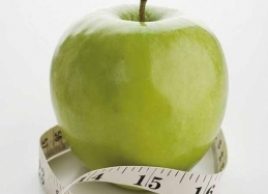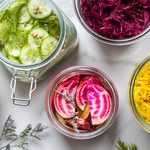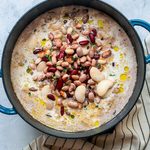Tired of dieting?
These golden rules of weight loss really work

Source: Best Health Magazine, Spring 2008
Bad diets are like history—they keep repeating themselves. Ever-popular get-skinny plans, such as Atkins and the Cabbage Soup Diet, originated decades ago. So why are almost two-thirds of Canadians still overweight? The reasons are many, but clearly fad diets don’t work. Very few people who go on a diet keep the pounds off in the long term. Still, losing even five percent of your weight can reduce your risk of diabetes and heart disease.
Today, researchers have revealed what does shed pounds, and their findings don’t involve liquid fasts or overloading on bacon. Rather, the golden rules of weight loss involve old-school ideas like portion control and eating real foods in lieu of processed diet treats. “We’re overeating and under-exercising,” explains Carolanne Nelson, a registered dietitian and assistant professor at the University of Prince Edward Island. “I don’t believe in dieting,” agrees Robin Evans, a 38-year-old copywriter in Vancouver, who lost 20 pounds in the past year by swapping processed foods for fresh choices, working out three times a week and walking her dog twice a day. “I just have a different attitude about which foods are healthy.” So be like Evans and try these proven rules to losing weight.
Golden rule #1: Battle portion distortion
Food today is B-I-G. Those store-bought muffins, Monday’s frozen entrée, your favourite fast-food lunch combo—they’re anywhere from two to five times the size they were 20 years ago, says Dr. Sue Pedersen, a physician specializing in endocrinology and metabolism at the University of Calgary. While most of us know this intellectually, few of us actually control portions, she adds. In a major 2007 study she led, participants who used a plate with protein, carb and sauce portion dividers were six times more likely to lose up to five percent of their body weight over six months than the group that didn’t. It works so well because it’s easy. “There’s no counting calories or weighing food,” she says. “All you have to do is portion it out.”
Golden rule #2: Don’t let exercise trick you into overeating
Gary Taubes’ controversial book, Good Calories, Bad Calories: Challenging the Conventional Wisdom on Diet, Weight Control and Disease, revealed that exercise alone doesn’t melt pounds. At best, it can maintain weight loss that is shed through healthy eating. But before you ditch your gym membership, try exercise and calorie control. Dr. Neil King, a senior lecturer at Queensland University of Technology in Brisbane, Australia, and the author of a September 2007 study in the International Journal of Obesity, explains that exercise stimulates our appetite and can trigger psychological yearnings (“I earned this ice cream bar”). Working out will still do you loads of good—for your health and your figure—as long as you don’t give in to the urge to compensate for calories burned.
Golden rule #3: Enjoy lean proteins—especially if you work out
Researchers at the University of Guelph found that participants on a higher-protein diet lost seven more pounds over 12 weeks than those on a higher-carb diet. Kelly Meckling, the author of the study published in Applied Physiology, Nutrition and Metabolism, discovered that dieters were more likely to stick to high-protein meal plans if they exercised, because working out helps us process protein. Leanne Elnicki, a 35-year-old Toronto-based newscaster, can relate. She hit a six-week plateau seven months into her current weight-loss journey —despite cutting calories and exercising regularly. “I was so frustrated!” she says. When a dietitian suggested that she up her lean protein intake from white meat and beans, however, the pounds started coming off again. Now she’s just 33 pounds away from her goal of losing 105 pounds. We’re not talking Atkins here—a restrictive approach that most registered dietitians don’t recommend. Lean proteins need to be balanced with fruits, vegetables and whole grains.
Golden rule #4: Calorie counting really works
A recent Journal of the American Dietetic Association review of 80 weight-loss trials —using strategies ranging from meal replacements to weight-loss medications—showed that the best results (16 pounds over six months) come from diets that track and trim calories. Amy Lees, a 27-year-old mom and part-time student in London, Ont., can vouch for this practice. She has lost a total of 140 pounds, or “a whole person,” as she puts it, using online tools that help her tally her energy intake. Her favourite sites are eDiets.com and sparkpeople.com.
Golden rule #5: Get a grip on emotional eating
A lot of recent research and weight-loss plans focus on external influences—for instance, the proximity of the chip bowl to your sofa. Yet thoughts and emotions that trigger overeating are often overlooked, says Dr. Heather Niemeier, an obesity researcher at the Alpert Medical School of Brown University. In fact, a recent study she led found that each point higher that participants rated themselves on an emotional eating scale predicted weight gain of an extra pound at six months and again at 18 months. To discover whether you are an emotional eater, write down what you eat, how much, when, how you’re feeling when you eat and how hungry you are. Over time, you may notice patterns that reveal the negative triggers you should avoid.
Golden rule #6: Dream small—like, size 4 small
Until now, experts have contended that overweight women who have unrealistic weight-loss expectations—double the average loss, for example—tend to give up early. But a new study in the International Journal of Obesity suggests that letting your expectations soar doesn’t mean you’ll be at risk for depression or pack on more pounds if you don’t reach your dream weight. Study author Anthony Fabricatore, an assistant professor of psychology at the University of Pennsylvania School of Medicine, says that unrealistic expectations may lead to more weight loss, although the loss is small.
Golden rule #7: Stop eating diet foods
We already know that many low-fat foods contain more sugar, carbs and sodium to improve flavour, but new, preliminary research indicates that diet foods may actually trigger overeating as well. A study in the journal Nutrition suggests that artificial sweeteners in diet soft drinks may stimulate appetite. Although more research is required to confirm this theory, you may be better off opting for a smaller portion of the regular version. Compare nutrition labels: If calories are equal, and the regular version is low in saturated or trans fats, stick with it. Keep in mind that women need certain nutrients and healthy fats in their diet. Calcium in dairy, for instance, is shown to aid in weight loss. And omega-3s boost heart health, says P.E.I. dietitian Nelson. “That’s why I always tell people to pick the regular salad dressing instead of low-fat dressing—because it contains healthy oil such as olive or canola.”
Found this article informative? Subscribe to our magazine today and receive more Best Health exclusives delivered to your door!




